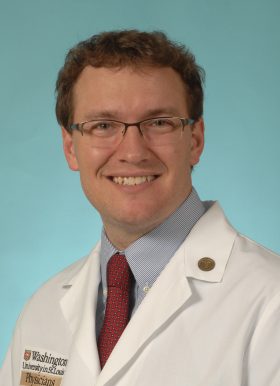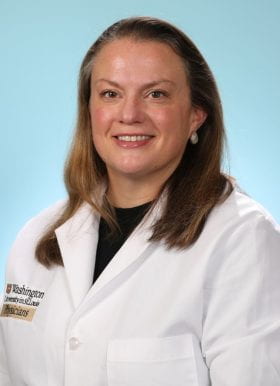Colorectal Surgery Fellowship
The Washington University in St. Louis/Barnes-Jewish Hospital Colorectal Surgery Fellowship celebrated its 40th anniversary in 2020, making it one of the longest-standing academic colon and rectal surgery fellowships in the United States. Our one-year clinical fellowship is board accredited for three positions each year. The colorectal surgery fellows work closely with 7 board-certified colorectal surgeons as well as gastroenterologists, pathologists, medical and radiation oncologists, enterostomal therapists, and professionals from other disciplines who expand and enhance the educational experience of the fellowship. The fellows have in-depth exposure to all aspects of colorectal disease and surgery.
The Section of Colon and Rectal Surgery also offers a research fellowship position. Interested candidates should contact the section for further information about this fellowship.
Clinical rotations
Fellows alternate with a senior resident (PGY-5) through four clinical rotations in 1-month blocks at two separate medical facilities: Barnes-Jewish Hospital and Barnes-Jewish West County Hospital. The Barnes-Jewish main campus rotations are supported with a consult resident (PGY-3), 2 interns and physician extender. The focuses of these rotations are extensive operative and inpatient experiences. Barnes-Jewish Hospital is a tertiary medical center so there is ample exposure to “bread and butter” — as well as diverse and complex — colorectal surgery. There are two rotations at the Barnes-Jewish West County Hospital. One rotation is an inpatient rotation that focuses on the operative and inpatient experiences. The second rotation is an outpatient experience that focuses on outpatient clinic evaluations, colonoscopy, anal physiology and surgical management. On this rotation, residents gain extensive knowledge of endoscopy, anorectal manometry and transrectal ultrasonography. During the yearlong fellowship, residents will have an extensive experience in advanced minimally invasive approaches such as laparoscopy, robot-assisted and transanal endoscopic microsurgical (TEM) procedures. Each fellow performed more than 75 laparoscopic, 15 TEM, and 10 robotic cases in the last 2 years. The fellows all reach a level of proficiency by the end of their clinical training to easily allow for credentialing in any future faculty position.
Research experience
Fellows are required to perform a clinical research project of personal interest during their year. This can be drawn from the colorectal databases or labs established at the Washington University School of Medicine. Fellows are required to submit an abstract for the annual meeting of the American Society of Colon and Rectal Surgeons as well as a manuscript for publication. Research education and support is provided throughout the year to allow for continued future collaborations and a seamless transition into an academic practice for those who choose to pursue that career path.
Application
Fellows are competitively chosen through the National Residency Match Program. Applicants must have completed a general surgery residency program in an accredited institution and be eligible to take, or have taken, the written (qualifying) examination offered by the American Board of Surgery.
All applications should be submitted through the Electronic Residency Applications Services (ERAS) website. Completed applications are reviewed by the colorectal faculty, and qualified applicants are given the opportunity to interview.
Program contact
For more information, contact:
Maddie Hodous, MHA at hodous@wustl.edu
314-362-8028
Program Director:
Matthew Silviera, MD, MS
Program Director, Colon and Rectal Surgery Fellowship




